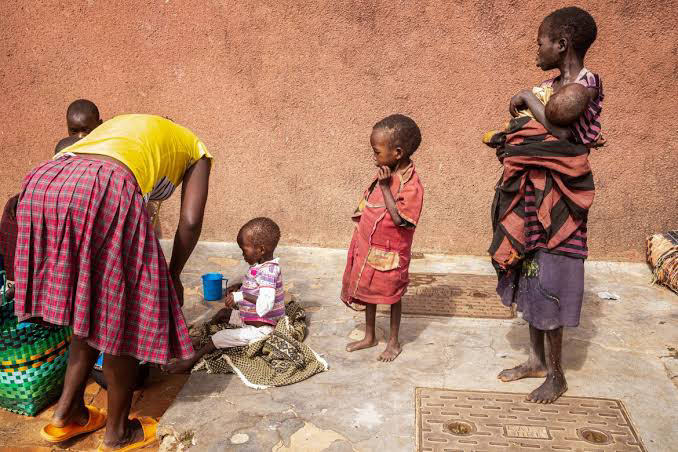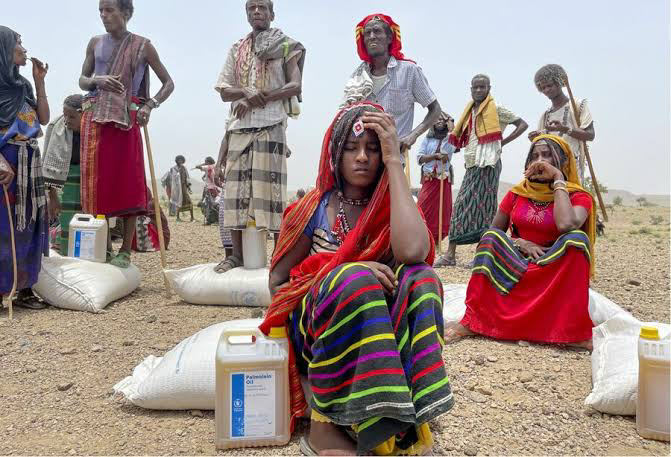Hunger now killing one person every four seconds, NGOs say + How to prevent future global food crisis
Greetings to my esteemed friends on the InformationWar platform. It's another day to share with us happenings around the world and this time it's about the global food crisis that have caused many innocent people across the world to died on a daily basis. It's your friend @faquan, saying hello from this part of the world.

“A staggering 345 million people are now experiencing acute hunger, a number that has more than doubled since 2019,” they said in a statement.
“Despite promises from world leaders to never allow famine again in the 21st century, famine is once more imminent in Somalia. Around the world, 50 million people are on the brink of starvation in 45 countries,” they said.Source
When we talk about acute hunger, we aren't talking about just a feeling but a situation that has killed many people in the past few months and is still killing many innocent people everyday. Most parts of Africa, most especially the Horn of Africa, are experiencing acute hunger. Although this can be related to the conflict and violence ongoing within the region and the overwhelming desertification and drought in the area.

It's true that the Horn of Africa and other parts of Africa are suffering from severe hunger, but it's currently a global issue that needs urgent attention.
Pointing out that as many as 19,700 people are estimated to be dying of hunger every day, the NGOs said that this translates to one person dying of hunger every four seconds.Source
Just the estimated number of people that die out of hunger on a daily basis and measure it by the billions of dollars put into fighting hunger, then you'll know that we have a long way to go globally.
What the world needs at the moment is to find a lifesaving support to fight hunger as well as find a long term solution to food shortages and hunger across the world.
According to the organisations, the global hunger crisis has been fuelled by a “deadly mix of poverty, social injustice, gender inequality, conflict, climate change, and economic shocks”, along with the lingering impacts of the coronavirus pandemic and the war in Ukraine, which further increased food prices.Source
The above shows a multiple causation of global food crisis, which isn't predominant to any country across the globe. Looking at injustice for instance and talk African leaders as case studies. It should be noted that monies might to build infrastructures and industries are amassed by a single individual or group of individuals who doesn't care about the welfare of the entire citizenry.
Most of the African region are aeriable and if citizens are given the right environment and facilities, then, Africa would be a major supplier of food stuffs, including grain.
It's very clear that the war in Ukraine has caused severe hardships and widened the food crisis the world is experiencing. Prior to the war, Russia and Ukraine are the third and fourth largest exporters of grain, while Russia is the major supplier of fuel and fertilizer.
With the monopoly of these two conflicting nations, the entire world is suffering from extreme high prices of goods, most especially grains.
We'll not remove the fact that climate change is getting worse as the day goes by and the devastating nature of desertification, drought and flood, the earth seems to be heading towards doom.
Even with the billions of dollars put into fighting climate change, it's getting worse by the day. In the Horn of Africa, famine and hunger is the order of the day.
How to prevent future global food crisis
It's obvious that we're already experiencing global food crisis, but we can reduce it's effects if we act quickly. I'll give my little piece of advise to the United Nations and other NGOs that'll help reduce food shortages and crisis.
global food production partnership. In this aspect, I mean here that nations should come together to partner in raising funds as well as getting aeriable lands that major food crops and other vegetables as well as grains can be cultivated. While high income countries provide funds, low income countries could give reasonable number of aeriable lands for mass production of crops. This project shouldn't be managed by any African leader, but by trusted individuals who would deliver the right amount of food produced to the United Nations. Why I said African leaders shouldn't be involved in this is because most African leaders would divert these crops and make huge profit out of them with delivering the products to the appropriate quarters.
encourage small scale farming across the world. Funds should be given to individuals who are willing to venture into small scale agriculture. These farmers shouldn't have export at the back of their minds, they should produce crops that'll cater for their localities and countries. With this in place, there'll be less dependence on imported products.
each region should cultivate what they can best produce. It's true that every nation of the world have what they can produce best. For instance, Ghana has large cocoa farms, so they should produce cocoa powder in large quantities and not compete with Nigeria in oil. Nations should concentrate on their best and not engage in unnecessary competition.
encourage tree planting to help reduce the devastating climate change and global warming. Trees help reduce erosion and flooding, but most trees are used as firewoods in rural areas. Encouraging citizens to plant trees rather than cut down trees will help the world come out of global warming.
https://www.aljazeera.com/news/2022/9/20/hunger-now-killing-one-person-every-four-seconds-ngos-say